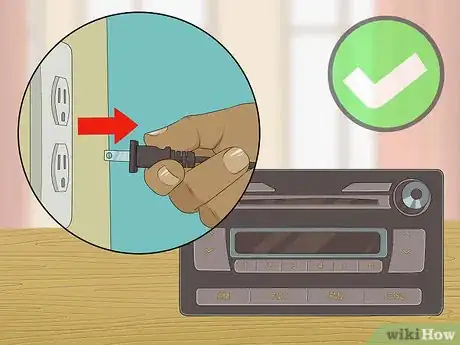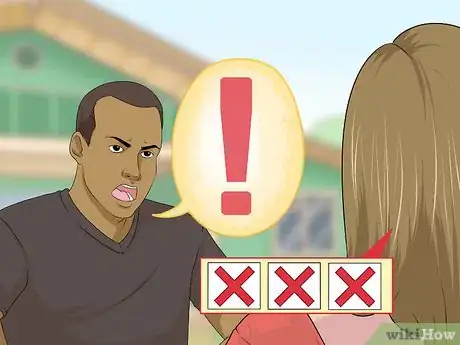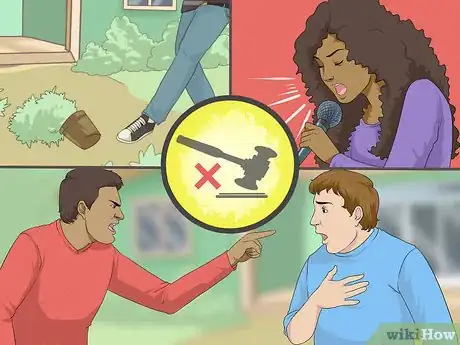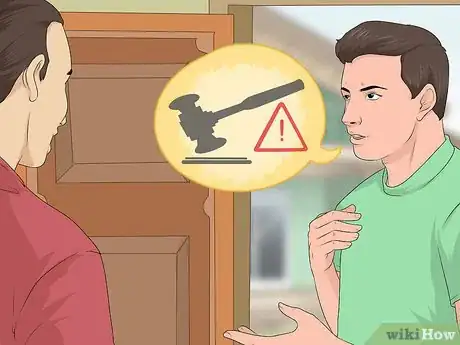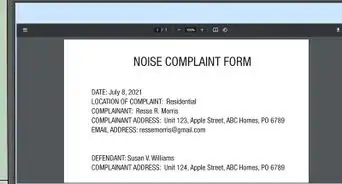This article was co-authored by Tami Claytor. Tami Claytor is an Etiquette Coach, Image Consultant, and the Owner of Always Appropriate Image and Etiquette Consulting in New York, New York. With over 20 years of experience, Tami specializes in teaching etiquette classes to individuals, students, companies, and community organizations. Tami has spent decades studying cultures through her extensive travels across five continents and has created cultural diversity workshops to promote social justice and cross-cultural awareness. She holds a BA in Economics with a concentration in International Relations from Clark University. Tami studied at the Ophelia DeVore School of Charm and the Fashion Institute of Technology, where she earned her Image Consultant Certification.
There are 11 references cited in this article, which can be found at the bottom of the page.
This article has been viewed 359,429 times.
Your neighbors' dog barks between the hours of 3 and 5 A.M., their teenager's music rattles your windows on the weekends, and somehow their trash keeps ending up on your lawn. Finding an effective but non-aggressive way to deal with bad neighbors is ideal, so start by kindly asking them to be more mindful of their actions. If being sweet doesn't get you anywhere, you might have to take more drastic measures – like talking to a lawyer or calling the cops. See Step 1 to learn how to deal with your neighbors starting right now.
Steps
Solving Specific Problems
-
1Let the neighbors know what's happening. Your discomfort might be completely obvious to you, but if you haven't told them, chances are your neighbors don't even know they're being a bother. While you're sitting there stewing and getting ready to boil over, they're just going about their daily life. Don't assume that they're being intentionally rude. Just knock on the door, introduce yourself, and let them know what the issue is.[1]
- Ask nicely, but make your point. Ask for exactly what you want instead of being vague and keeping them guessing. It's not fair to expect them to be able to read your mind and know your limits – you need to tell them what you want.
- Be willing to compromise. While you might be happy to never again have to hear the teenage son practicing tuba, it's probably not practical to ask your neighbors to soundproof their garage. Use a complaint that they'll be more sympathetic to, such as the noise keeping you up after your bedtime. You'll have more success if you approach the neighbors with a problem and a willingness to talk about possible solutions, instead of charging in and demanding specific behavior.
-
2Only communicate in writing when necessary.[2] If you have difficulty reaching your neighbors, you can leave a note or email expressing your wishes.[3] However, this can be risky, because the notes are easily misinterpreted as passive-aggressive messages. That said, if you can't get hold of your neighbors in person, sometimes leaving a note is the best option. Most people will feel a little embarrassed and immediately change their behavior to accommodate you.
- Make sure the note is friendly in tone. Tell your neighbor that you'd like to find a solution that works for everyone.
- If you're comfortable putting your phone number in the note and encouraging your neighbor to call you, do so. That way if your neighbor has any questions you can get them cleared up right away.
Advertisement -
3Pick your battles. Don't give your neighbors a laundry list of problems you want them to address – it won't go over well. Figure out what you can live with and what must change, and only present your neighbors with problems that are driving you crazy. Once the main issues are solved, you can get to the smaller matters at a later date, or learn to live with them.[4]
- Remember that what's most annoying for you isn't necessarily the easiest for them to change. If they've explained that the problem is difficult to fix, consider asking for something easier instead.
-
4Offer to help out. Depending on what you're asking your neighbors to do, they might be more amenable if you offer to help them make it happen. For example, if you like a nice, neat yard and are tired of seeing their unkempt weeds all summer long, you could offer to help them get the yard back in shape.
- Even if the problem isn't something you can fix yourself, helping out can give the neighbors time or inclination to respond to your request. For example, if the neighbors can't fix their broken engine muffler because they use their car all day, offer to drive them between the mechanic and their workplace, or to run some errands for them while the car is being repaired.
- Don't offer to give money or hire someone. Many people bristle at the suggestion that they can't afford to fix their own problems.
-
5Follow up either way. Give the neighbors a reasonable amount of time to fix the problem, perhaps a few days for minor tasks, or longer if you're asking for something time-consuming like fixing up their house's appearance. If they still haven't made an effort, return for a polite reminder. If they have, thank them or even bring over a small gift of food, and they will be much happier about having to do it.
- The next time something happens, stop and think about an appropriate response. If the neighbors are still playing loud music every night, it's time for another complaint. If the neighbors have been relatively quiet for weeks and are now throwing a birthday party, put in earplugs and give them once a year to be loud.
- Keep lines of communication open afterward, even if it's just a wave and a hello. If you're a forgettable presence that shows up only when there's a problem, your neighbors won't be as inclined to listen to you.
-
6Get help from other neighbors.[5] This is a good step to take if the "bad" neighbors show no signs of changing. If an issue is affecting you, chances are it's affecting everyone on the block or in the building. Talk with your other neighbors to find out if they're willing to sign a letter addressed to the neighbors at fault. There is strength in numbers, and being approached by an entire group instead of a single person could be what it takes to get the bad neighbors to change.
- This doesn't mean you and your neighbors should storm the bad neighbors' house or apartment – that could get out of hand and make the neighbor feel threatened. Even a group email can feel "us vs them."
Repairing a Bad Neighbor Relationship
-
1Behave in a neighborly way yourself. Make sure you aren't doing anything that could be getting on other people's nerves before you bring up the problem. Especially if there's bad blood between you already, you don't want to make the problem worse by appearing hypocritical or insensitive.[6]
- Make sure you're not picking them out, either. If you don't want them to play music at 3 AM, your old friends Ken and Janet next door shouldn't be able to do the same thing.
-
2Give your neighbors warning in advance. If you are planning a late night event, won't be able to keep up with the yard work for a while, or anticipate any other issues that could bother your neighbors, let them know. Have a quick conversation about it and give them your phone number to call if there are any issues. It's amazing what changes from "intolerable" to "no problem" if you just take the time to communicate.[7]
-
3Give your neighbors the benefit of the doubt. Just like everyone, your neighbors have problems in their life, even if they aren't obvious to you. Your neighbor may find it difficult to take the time out of their life to acknowledge and handle another person's problems. Don't fall into the same trap.
-
4Get to know them better.[8] Is your neighbor nameless and faceless, or do you actually know each other? It's a lot harder to care about someone you've never met, and resentment can build quickly when neighbors don't bother forming a relationship with each other. The best way to get what you want – some peace and quiet on the weekends, for example – might be to forge a relationship with your neighbor so you understand each other better and are more willing to be considerate. You don't have to end up as best friends, but seeing each other as people is a good start to increased neighborliness.
- Why not invite your neighbors over for a meal? Ask them to come over when you're having a summer cookout, or invite them for pancakes on a Saturday morning. Get to know each other before you make any requests.
- If inviting them into your space is a bit much, you could take over a bottle of wine or some home-baked cookies and introduce yourself.
-
5Improve the neighborhood. If you really want to repair relations with your neighbors, start planting flowers on a deserted lot, petitioning the local government about safety issues on your street, or organize a trash pickup. Reach out to all your neighbors and give them the opportunity to feel included in the project.
Taking Drastic Measures
-
1Use these only as a last resort. These are drastic measures that are likely to take a long time to work, and make relations with your neighbors even worse. They are only suitable for neighbors who have been actively hostile toward you, or who have a pattern of sustained rude behavior, complete unwillingness to change it when asked, and even then only if the behavior has seriously affected you. You're going to have to live next to these people for a while; think carefully before you turn a disagreement into a feud.
-
2Document the problem you're facing, if it violates local law or leases.[9] If you tried asking nicely and your neighbors weren't responsive, it's time to take more drastic measures. Begin by documenting the problem so that you can back yourself up if you have to involve the authorities. Take pictures of property damage, take video of parties that spill into your yard after midnight, save emails and notes, and so on. Basically, gather proof that your neighbors are trespassing or otherwise engaged in illegal activity.
- You may wish to inform your neighbors that you're doing this. When they know you're hard on their trail, that may be the motivation they need to quit pulling those stunts.
-
3Consider calling the landlord. If you live in an apartment building, it may time to get the landlord involved. Call the landlord and explain how your neighbor is disturbing the peace in your living space. Depending on the infraction, the landlord might decide that he or she has grounds to evict the bad neighbors. At the very least, the landlord should discuss the issue with the bad neighbors so you don't have to keep complaining.
- Use your best judgement on this one based on previous interactions with the landlord; some landlords hate having to deal with their tenants' disputes, and may get irritated at you for calling.
-
4Find out whether they're breaking the law. If the bad neighbors still won't change, figure out what legal action is available to you. Get familiar with your local laws and determine whether your neighbor is breaking any. If your neighbor is in violation of any laws, you might be able to take action. Look up laws on the following:
- Trespassing
- Property destruction
- Noise violations
- Barking laws
- Laws regarding property maintenance
-
5Call the police or another authority. This and the remaining steps below fall into "last resorts" territory. Your relationship with your neighbors will likely never be repaired if you take this step. Getting the police involved is one way to shock your neighbors into changing, but don't use them as your personal dispute mediators.[10]
- If the issue is loud music, call the non-emergency police number.
- For unkempt yards, call the Homeowners Association (where applicable) or the city nuisance abatement officer. Most cities have nuisance abatement, or code enforcement officers, who are responsible for maintaining code compliance.
-
6Inform the neighbors you're considering legal action. Once you've determined that the neighbors are indeed breaking a law, and you've collected some evidence to prove it, let them know that you plan to take legal action. You don't have to give details – just tell them that you're planning to take this to the next level unless you can reach a compromise. They probably won't want to get tangled up in legal issues, so just telling them that you're prepared to sue may make them decide to change.
-
7Talk to a lawyer about your options. If you're willing to put your money where your mouth is, call a lawyer and figure out what you can do. You must decide whether solving the problem is worth the headache of legal fees and open contention with your neighbors. If you're set on getting this matter settled legally, work with your lawyer to file a lawsuit and potentially bring your neighbors to small claims court.[11]
- If nothing else, you may be able to work out with your landlord to get out of your lease without breaking it illegally. If you've alerted him to the situation and he's done nothing about it, it certainly doesn't make him look good, so he may let you go – especially if you're going to get a lawyer involved. Consider this compromise instead of getting dragged into hours of court time and court fees that even you probably don't want to deal with.
Community Q&A
-
QuestionWhat can I do if a neighbor continues to trespass onto my property and parks his junk cars and plants on my property? He refuses to move them and calls my husband and I offensive names.
 Community AnswerCall the non-emergency police number and ask the police to help.
Community AnswerCall the non-emergency police number and ask the police to help. -
QuestionIf I have a neighbor who has been arrested for assault and is now harassing our new neighbors, can I tell the new neighbors about the this neighbor's arrest record?
 Community AnswerNot only can you tell them, you should. If this person already has a record, they have a right to know that they could potentially be in danger.
Community AnswerNot only can you tell them, you should. If this person already has a record, they have a right to know that they could potentially be in danger. -
QuestionWhat can I do if my neighbor's children pick on my disabled son?
 Community AnswerHave you approached your neighbors about this yet? That would be the first logical step. If they are uncooperative, you may want to consider involving the police, if the harassment is bad enough. Document and video any bullying so you have the evidence on hand if needed.
Community AnswerHave you approached your neighbors about this yet? That would be the first logical step. If they are uncooperative, you may want to consider involving the police, if the harassment is bad enough. Document and video any bullying so you have the evidence on hand if needed.
Warnings
- The most important thing you should never do is threaten your neighbours, this will just make matters worst, keep your words to yourself.⧼thumbs_response⧽
- Stay on your own property, as trespassing will just incite them. Walking to someone's front door is allowed, but walking into a yard is illegal.⧼thumbs_response⧽
References
- ↑ https://rentberry.com/blog/bad-neighbors
- ↑ https://www.moving.com/tips/how-to-handle-disputes-with-neighbors/
- ↑ http://www.askmen.com/money/how_to_250/288b_how_to.html
- ↑ http://abcnews.go.com/US/nasty-neighbors-10-tips-defusing-situation/story?id=20298171
- ↑ https://www.instantcheckmate.com/crimewire/post/handle-bad-neighbors/
- ↑ https://www.mensjournal.com/health-fitness/gentlemans-guide-dealing-bad-neighbors/
- ↑ https://www.brickunderground.com/blog/2014/11/holiday_party_etiquette
- ↑ https://www.huffpost.com/entry/dealing-with-bad-neighbor_n_5844564
- ↑ https://www.instantcheckmate.com/crimewire/post/handle-bad-neighbors/
About This Article
Dealing with bad neighbors is never fun, but if you’re polite and civil with them, they’ll be more likely to cooperate. Try asking them nicely to stop doing whatever’s bothering you. For example, if they’re always playing music late at night, say something like, “I don’t mind you playing music during the evening. I like my music loud too. But could you turn it down after 10 PM so I don’t hear it in bed?” It’s best to talk to them in person if you can, since letters and notes can be misinterpreted as passive aggressive. Even if your neighbor’s being out of line, offer to come to a compromise so they don’t think you’re being confrontational. Only call your landlord or the police as a last resort, since this will probably annoy them and might make things worse. For more tips, including how to repair a bad relationship with your neighbor, read on!






